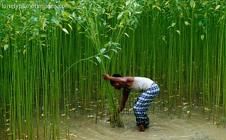Interviews
Jute sector explores advantage of carbon credit
27 Jun '13
5 min read

Paper & plastic bags create a significant problem for the environment; it is time for the entire world to address the plastic and paper bag problem. Paper bags are made by cutting down trees and clearing out forests for the wood to make the paper. The U.S. uses around 10 billion paper bags per year, requiring around 14 million trees.
“One ton of paper requires the cutting of 17 trees”. Paper bags have a much higher global warming potential (GWP) because of the heavy impact of timber harvesting and pulp production on our forests. Jute as a renewable energy source can be a good alternative as raw materials for papers.
Each year, an estimated 500 billion to 1 trillion plastic bags are consumed worldwide. That's over one million plastic bags used per minute. More than 1,000 years is required to break down for a non-recyclable plastic in a landfill and is a great threat for the environment. Plastic bags are made from oil, and to make it 4% of oil used globally. There are biodegradable plastic bags, but they take years to decompose, or they aren’t biodegradable at all.
As for reusable, biodegradable bags being the answer to the world's environmental problems. In this case jute made bags and jute products can be the sustain-able alternative to reduce the global warming and protect the environment.
There are nine CDM projects in Bangladesh but none is on jute. More than 200 CDM projects from India have been approved by the UNFCCC CDM Board. Jute Industry participation in earning CER is more than 3%. The Belgian Minister of Climate and Energy purchases the CERs from a small scale biomass CDM project in Howrah, West-Bengal (India) through Howrah Mills Company Ltd.
The project uses jute biomass residues as a substitution for coal in the steam generating boiler onsite and contributes to sustainable development in the area. The annual amount of CER of the project is about 5,169 tons of CO2. Kamarhaty jute mill set up rice husk based 5 MW captive power plant and registered for carbon credit. Jute industries adopting CDM projects are having good potential to earn out of carbon credits.
- Use of non-conventional energy, adoption of energy efficiency technology
- Use of carbon neutral products/agro-based prod-ucts in steam generation and power generation.
- Replacement of fossil Fuel in jute processing by oils of vegetable origin.
Popular News
Leave your Comments
Editor’s Pick
































-Ltd..jpg?tr=w-120,h-60,c-at_max,cm-pad_resize,bg-ffffff)





.jpg?tr=w-120,h-60,c-at_max,cm-pad_resize,bg-ffffff)
.jpg?tr=w-120,h-60,c-at_max,cm-pad_resize,bg-ffffff)






